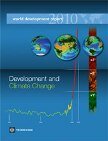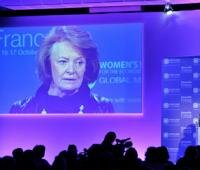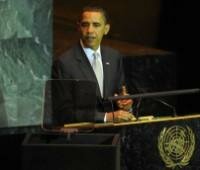Women debate a new way forward for the World's financial system
Issue:Marginalisation
Many in the west are blind to the fact that poverty and social injustice create a breeding ground for conflict. "An Iraqi youth recently said to me that if he and his family were hungry and he couldn't get a job, he would go to fight with whoever will pay him".
Read more »Posted on 18/10/09
Impact of Climate Change on Agriculture
Issues:Climate change, Competition over resources
A report published on the 30th September by the International Food Policy Research Institute (IFPRI) estimates that 25 million more children will be malnourished by 2050 due to the effects of climate change. The report predicts that climate change will lead to price increases for the most important agricultural crops: rice, wheat, maize and soybeans. Wheat prices are projected to increase globally by 170 - 191% whilst rice prices may increase by 113 - 121%.
Photo: Bluemoose Official License
Read more »Posted on 30/09/09
Analysing President Obama's Address to the United Nations General Assembly
Issue:Climate change
There were many positives in Barrack Obama's speech to the United Nations on the 24th September. The US President outlined the importance of the UN as an institution and more importantly its function as a forum through which the nations of the world can collectively address shared problems. He reaffirmed America's commitment to an "era of engagement based on mutual interest and mutual respect" and to seeking "the goal of a world without nuclear weapons".
However...
Read more »Posted on 25/09/09
World Development Report 2010: Development and Climate Change
Issue:Climate change
 The World Development 2010 climate Change Report published in September outlines how a 2 degree centigrade rise in global temperature would likely cost Africa 4% of GDP whilst the impact on India would be %5 of GDP. Developing countries are already disproportionately impacted by climate change with 80% of the worlds population located in the developing world.
The World Development 2010 climate Change Report published in September outlines how a 2 degree centigrade rise in global temperature would likely cost Africa 4% of GDP whilst the impact on India would be %5 of GDP. Developing countries are already disproportionately impacted by climate change with 80% of the worlds population located in the developing world.
As the report states:
"Solving the climate problem requires a transformation of the world’s energy systems in the coming decades. Research and Development investments on the order of US$100 - $700 billion annually will be needed—a major increase from the modest $13 billion a year of public funds and $40 billion to $60 billion a year of private funds currently invested.
Developing countries, particularly the poorest and most exposed, will need assistance in adapting to the changing climate. Climate finance must be greatly expanded, since current funding levels fall far short of foreseeable needs. Climate Investment Funds (CIFs), managed by the World Bank and implemented jointly with regional developing banks, offer one opportunity for leveraging support from advanced countries, since these funds can buy-down the costs of low-carbon technologies in developing countries."
The report is published at an important juncture as world leaders begin positioning themselves in the run-up to negotiations at Copenhagen.
The full report can be downloaded here.
UK Opposition Parties outline potential Defence Spending Cuts
Issue:Global militarisation
Liberal Democrat Treasury spokesman Vince Cable and Shadow Chancellor George Osborne have both highlighted potential defence spending cuts should their parties come to power. In a pamphlet for the think tank Reform, Cable identified nine ideas for budget savings, which included scrapping the Trident nuclear missile system as well as other defence procurement programmes including tranche three of the Eurofighter aircraft. Osborne, following a speech at a conference organised by the Spectator magazine, echoed Cable in citing the Eurofighter project and also identified the project to build 2 new aircraft carriers and a £2.7 billion order for 25 A400 transport aircraft as specific potential savings.
Read more »Posted on 24/09/09
Share the World's Resources (www.stwr.org)
Issue:Marginalisation
Tag:WEBSITE
 This website presents an extensive database of the latest news, analysis and information on a variety of international issues. There are currently over 2,000 articles available covering issues ranging from globalization to poverty, climate change, people power and much more.
This website presents an extensive database of the latest news, analysis and information on a variety of international issues. There are currently over 2,000 articles available covering issues ranging from globalization to poverty, climate change, people power and much more.
The objectives of Share the World's Resources are
1. To raise awareness of how and why the dominant international economic and political systems are incapable of ending poverty, creating a sustainable economy, or mitigating climate change.
2. To propose an alternative sustainable economic framework based on international cooperation and the sharing of essential resources.
3. To campaign for governments around the world to initiate global economic reform and to share essential resources in order to immediately secure basic human needs for all.







